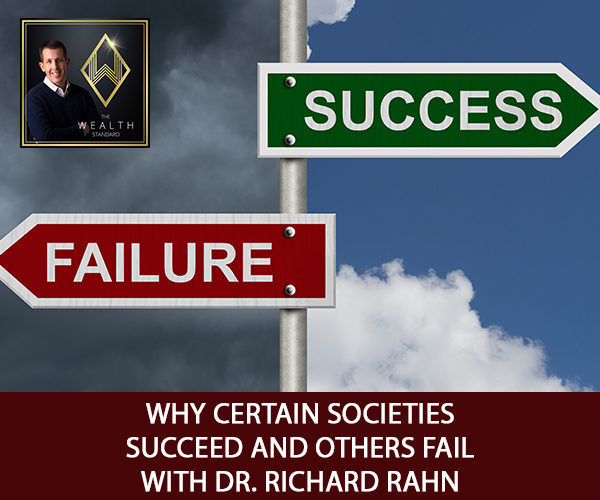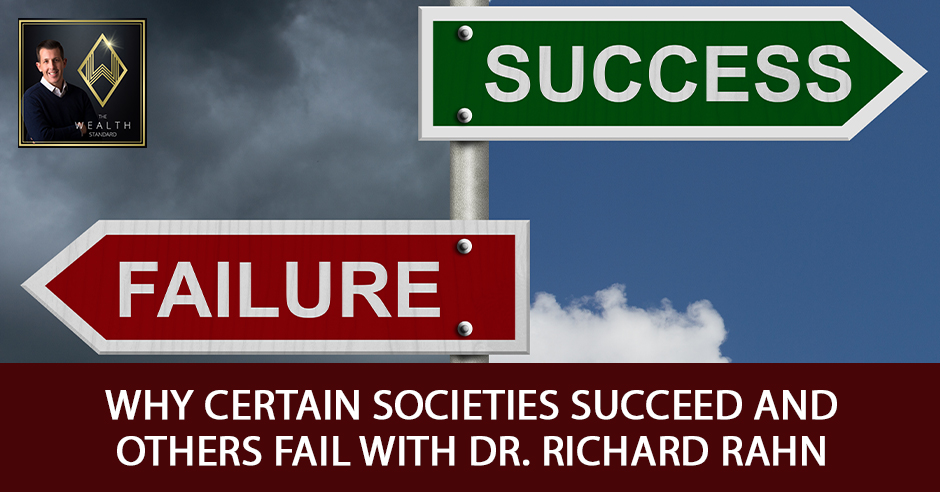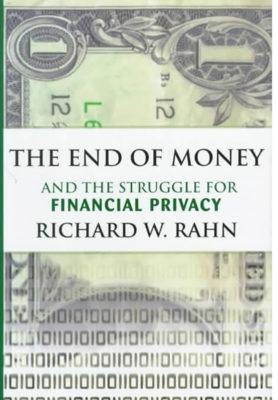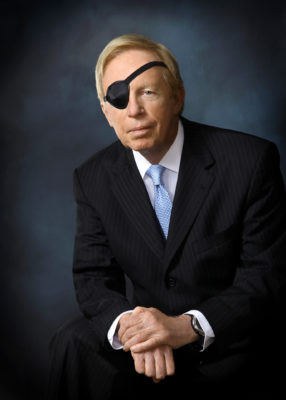Financial Structures: A New Gold Standard With Anthem Blanchard

It’s no surprise that financial structures drive so much of the world: how people interact, how people do business, and how people consume. However, with the changing times, financial structures are also adapting, which means that it’s everyone’s responsibility to keep up with what’s going on and continue to be informed. Patrick Donohoe is joined by Anthem Blanchard, the Co-Founder of both AnthemGold and AnthemVault. Anthem and Patrick hit on the many ways that financial structures, as they are, play into our daily lives. They also dive into what could be coming next and how people can put themselves in a position where they can adapt.
Watch the episode here:
Listen to the podcast here:
Financial Structures: A New Gold Standard With Anthem Blanchard
My guest is Anthem Blanchard. He is the CEO of AnthemVault.com, as well as AnthemGold.com. Anthem has a long family history of being in the financial services space, specifically around the asset that has proven itself worthy throughout history which is gold. His father, Jim Blanchard, was the primary influence and lobbyist to legalize the ownership of physical gold, which those of you who understand and know history was made illegal during the Great Depression in 1933. In 1974, Anthem’s father put lots of pressure and he did on previous presidencies as well, but they finally legalized the gold. Anthem has continued the legacy of his father and Anthem Gold is a traditional golden silver broker with vaults around the world.
They have lots of inventory where most don’t have any inventory. He has also taken it a step further. AnthemGold.com incorporates the idea of blockchain and cryptocurrency. It is the first cryptocurrency that is backed with a hard asset, which is gold. You’re going to get a kick out of this episode. He’s a genuine guy and intelligent when it comes to money and carrying on that family legacy and doing some amazing things. We talk about a lot of books and other things. We reference a few different areas where Anthem has been inspired and where he goes to find opportunities.
We have a new YouTube channel. It’s YouTube.com/thewealthstandard. We switched over from another YouTube channel. I hope you’re doing well. I hope you’re taking advantage of this very tumultuous time where it may seem like opportunities aren’t there. I realize how difficult it is looking around and trying to find the good in what’s going on but there’s a lot of it. I hope you are capitalizing on opportunities and seeing how things are going to evolve and improve and how we’re all going to grow from this set of difficult circumstances. Thanks for reading. Thanks for the support. I hope you learned something from this episode.
—
Anthem, it’s awesome to have you on. Thanks for being here. Thank you for what you do. I’m excited to get your perspective about what’s going on. We’re in interesting times and you have such an incredible background and bring a perspective that most don’t have. First, as you sit back and paying attention to what’s going on, how do you characterize what’s going on in society and in markets? How do you describe it?
What we’re seeing is a great shift in value, understanding value and how we value services, goods, people and other things like health. It’s causing a big inflection because when you don’t have things, all of a sudden it causes you to think like, “Do I miss these things? Do I want these things? What was I doing these things?” It’s perverse in a way. I hate to even talk like that because it’s such a crazy, hysterical time for a number of reasons. I think that there are a lot of good positives that are coming out of this. You have to stay positive. Otherwise, you’ll fall into the doom trap and that’s a death spiral.
My kids are home and they were asking me questions about the music we used to listen to when we were kids. I remembered my brothers and I, my mom likes the band Chicago. It’s their song about you don’t know the value of something until it’s gone, until you can’t do something. You’re right. It’s being healthy or not being able to travel and having to be confined to close quarters. You start to value friendships, freedom, commerce and employment. As you get into the markets, that’s added a layer because you had the hysteria of the Coronavirus. Now you have the hysteria of the markets. You have those two things happening and here in Utah, you have the hysteria of earthquakes. It’s like three waves. As you specifically look at markets, are you surprised by how they’re acting like what’s going on in markets? Maybe speak to the bailout that is about to be passed and what you feel that’s going to do.
Anyone that would say they weren’t surprised by what happened, there wasn’t an emergency federal rate cut for many years and then two happened in three days. That was definitely a shocker. The unemployment numbers. It looks like there’s a chart error because the charts are so high with the number that they put out. All those things being said, you and I being in the United States, we should feel extremely grateful because of all of the 100-plus jurisdiction countries that we could be living in, probably the US will be the best off because it has the world’s reserve currency. Whether anyone else in the world likes it or not, the system is what it is and it’s a dollar system. I think it will fade into the sunset. I don’t expect it to pull a Titanic. We need it and we’ll need it until we don’t need it.
How would you explain to someone that doesn’t necessarily understand why markets would need rates to go down or why the fed stepped in and did this mass disruption to create liquidity? Why did that have to happen?
It relates a lot to the genius that you teach and that you help provide people with infinite banking and different products that provide leverage. That’s a microcosm of how the entire system works. That’s why it’s such an effective strategy. We probably are sitting on 4 or 5-plus quadrillion of US dollar-denominated, they call it interest rate swaps. These are very sophisticated credit instruments that the very largest banks and central banks deal in. When you look at these numbers, $100,000 per person in the US would increase the debt at $33 trillion, which is gargantuan by GDP. It eclipses GDP. In essence, that still would only be less than a hundred. That looks like a total US dollar derivative. There’s a massive deleveraging that’s happening. At the same time, there’s also a releveraging happening by the Federal Reserve because they agreed that US Treasury and part of the bailout to bail out the fed at least $500 billion for whatever.
In an attempt on the government side, that’s why you’re seeing this fiscal policy pushed by both Trump and Bernie Sanders and everyone in between of having to put dollars out there. An old friend of mine, Mike Maloney, told me many years ago that he expected one day to see lifetime tax refunds. I thought that was curious but in a way, I was like, “You might be right.” I think now it’s more evident than ever of his theory probably being proven true there. I think that’s the path because the system needs it for its existence. It needs to be reinflated with a value from the base level as possible.
What happens if it doesn’t get it?
We’re going to see massive credit contraction. In this day and age, because of what happened several years ago, the Federal Reserve spent so much time. We had experienced the longest bull run in security market history. The Fed, Ben Bernanke, Janet Yellen, the whole regime spent so much time putting in all of these backstop mechanisms to be able to show signs of strain with a push of a button. Kashkari came out and said it, one of the big fed heads. They’re going to push the button and they can print more. They can buy whatever they want. It’s what discrepancy of what they’re willing to buy. That’s what it comes down to and how much.
I know why that’s a good thing. If you have so much debt out there and you have businesses using debt to grow. People are using debt to go to college, buy a house and buy cars. I can see why it’s a good thing, where you have the fed stepping in and ensuring that that continues to happen. Why is it bad that that continues to happen? We always hear the positive. What’s the downside? How are we ultimately going to be even more negatively affected?
The downside is that the reality is 95% of the value will probably go to less than 5% of the people. The reality is most of us will get hurt more because our goods and services like what we buy and sell every day relative to what we make every day will become harder. It will become more costly, more expensive for most of us to live. You read about billionaire, art collections of CEOs and public companies that were bailed out. You can start seeing where a lot of this value goes like Art Basel, people buying bananas that are rotting to take the simple deduction because then you get the appraiser to appraise the banana that you bought for $200,000, whatever. There was a great meme about this.
We're evolving away from money to barter. Share on XYou take that appraisal thing and you donate it, then you get the deduction. You get the huge write-off from all the stock that you sold that you pumped up with all the buybacks. You decide from the zero interest rate policy or even before we went zero, still the rates were ridiculously low. If you were a big company, you could access them. If you or anyone else, you couldn’t unless you’re smart. They’re trying to find retail investors. The best way to get yield and leverage is a big part of the game.
What do you feel is the end game? A lot of these activities and what’s going on can’t happen forever. Plus you have a very globally connected world where when we do something in the United States, because of how we exchange globally, there’s an impact across the board as we’re putting $2 trillion into the economy. What’s amazing is I feel like the wall is being pulled over people’s eyes because there are these guys who are like, “You’re going to get $1,000. You’re going to get $500 per child. You’re going to get this money.” That’s a small portion of the bailout. It’s more than double that as far as other money that’s going to be created and go to certain places. As you’re talking about corporations that had their hand out for stimulus, whether it’s Boeing. It’s every industry. Everyone has their hand out. Why is it a bad thing that companies have to get to that point in order to continue their operations?
It’s a scalability story. That’s what you’re alluding to. What this whole problem is showing and exposing is that we’ve reached the limits of the scalability of the current economic system that we’ve had for thousands of years. That’s been a hierarchical, centralized, money-based, bank-based system, lending and fractional reserves ultimately to make up for the fact that none of us can trust any of us 100% because it’s impossible for any of us to prove 100% anything that we’ve done in the past. Because there’s always doubt, it causes fear and collusion to be necessitated. Who do we study in history? The people that get the wealthiest and the people that killed the most people. Are these things coincidences? No, they’re all a fact of what I call force commerce or forced marketplace. We’ve had to necessitate rules of force, reprisal and punishment in order to try to enable trade in the world that we lacked trust. I think what’s happening is that people are starting to appreciate this point because for every $100 of debt that the government, the fed, central bank around the world or government might add, at this point, they might only be getting $0.50 or $0.10 of new economic growth.
It’s diminishing returns. We’ve never had negative interest rates for this long of a period for this many debt instruments ever for thousands of years of recording in history. I was a finance accounting major and EBA. It defies the whole concept of risk-free rate. Once the treasury goes negative, which I expect it will happen eventually, probably in the next several months. That defies all finance axiom. That is the axiom of finance. You’re taught in every first finance class, the treasury is the risk-free rate. That’s one of the basis is that you apply everything else in finance on. I look at it like we’re moving to barter. That sounds crazy, but it’s moving away from this idea of a violent currency that has to be defined by people, governments, central banks, some third party conduit of value.
You want a good, here’s a key for it. You want a service, here’s a key for it. You want to get that key for good or service, you get that key and you trade. All the headaches of all your accounting, your bookkeeper, your auditor, your reconciler or your inputter messing up. All of these traditional business headaches that you and I deal with every day. This is going to be eliminated with the commercialization of Bitcoin. Bitcoin being the first trusted historical record that man has ever created and being the strongest historical record that men has ever created has led the path to create all these other communities.
What these blockchains are, they’re communities. They’re protocols technically, but they’re communities of people that believe in the value of the service or good that provided so much that they’re willing to contribute to the proliferation of this better service. This is the era we’re going to see. It’s going to be cooperation, voluntary-based instead of this idea of you’re forced to inscript in the government’s draft or this or that. It’s forced. Volunteerism isn’t really volunteerism. We’re going to be in a much better place. I hope we get through this time quickly and peacefully as possible. That’s my greatest hope.
What has to happen in order for a new system to take place? Because I look at what the fed has to lose, what corporations have to lose by the system that we’re in. Also when there is disruption among people, the emotions spread quickly. Look at the toilet paper idea. I get it. I know why a person would respond the way that they responded. It’s very irrational but we all do that. We’re all human beings and are susceptible to that. When somebody is in that fear and uncertainty mode, is that the time when somebody looks to a different system or are they looking to the same system for help and guidance, which is happening? What do you feel has to happen in order for us to go to maybe a new monetary system?
I think it’s both depending on the personality type. You can look at it by the numbers. Even the doom website like Zero Hedge were showing that the US savings rate is about 8.5%. I remember reading articles years ago, it was zero or negative. That to me is a great deal of this new devastated nuclear looking landscape that we’re looking at with stocks and monetary policy. Something that’s encouraging to me is that people are thinking about savings. That shows that people are thinking in that behavior. The fear part of it is starting to make people think about, “The way that I do things, how secure is it?” One of the areas that we specialize in is ransomware. I would argue the biggest under recorded story of 2019 and 2020 is a number of infections of ransomware.
It tripled in 2019 and year over year, 2/3 of those were government debts. The vast majority of them went unreported. I know of one case in Los Angeles in particular. You’ve never heard of this story. The City of Torrance got it. Another city that’s arguably the most important to a certain industry, that’s arguably the most important to the country, got hit twice in 2019 and didn’t report it. $7.5 billion of reported losses in 2019, 2/3 of those were government. Bitcoin ends up solving this issue because of the way that it’s distributing the data, rather than centralizing the data, which is what we have. Everything is centralized, whether it’s Google or Amazon or any of these services. There’s a central company and they might have decentralized depots of servers but at the end of the day, you still have to rest your information on one instance and then you’re on there one gigantic stride.

Financial Structures: Whether it’s Wall Street or big business, what they got away with was placing the blame on people’s irresponsibility with their mortgage, but that’s not what collapsed the market.
What they call public protocols is the techie term that blockchain was. There’s information all over the place. It’s like having an Easter egg hunt. They’re hiding a bunch of value all over your property instead of in one place with the additional benefit that they have to get every little piece of the code and put them together to have the whole thing be a value to them. This type of architecture is a hundred-plus times more secure than what exists now. There’s been a lack of recognition because even a city of under 100,000 probably has over $100 million budget if it’s somewhere between 50,000 and 100,000 people in this country. We’re used to throwing money at things, more municipal bonds, more bonds, more money into the same location, areas and things.
It takes times of stress to point out where the breaks are. We’re used to doing this in business all the time long, especially in software. They call it stress testing of the software where you do all kinds of crazy things to it in preparation of what happens in these what-if scenarios. I think we’re experiencing one of these macro what-if scenarios of the society. It’s causing us that I have a lot of inflection whether we like it or not, whether we think it’s a conspiracy or not, whether we think who’s behind it or it’s nature or not. Whatever it is, irrespective, it doesn’t matter.
To me, disruption is good. You’re hitting on something that I hadn’t thought about. I’m going to try to articulate it so that the audience can understand it. For those that don’t know what ransomware is. We got hit some time ago and thankfully we caught it within a day. We had cybersecurity insurance and we were able to shut everything down and do new authentication. It would have cost us $300,000, $400,000, but we were able to do it for our deductible, which is $7,500. I think our premium went pretty high at this last insurance. Our systems are amazing. My brother is second to the chief legal counsel for a big hospital network in Colorado and they got hit.
They had their information taken. They weren’t able to catch it and they had to pay $2 million or $3 million in Bitcoin. My brother is like, “No one even knew how to get Bitcoin.” It’s one of those amazing things where it’s happening everywhere. What it’s doing is it’s causing people to realize like, “Our systems are vulnerable. We need a new system,” but it hasn’t gone to the money thing yet. That’s what you’re more referring to. It’s gone to compromised systems. Being able to create stability to create security there, but when it comes to how you do transactions with other people, that’s what you’re referring to. It’s that second level.
It’s a little of both. For example, we’re talking with different officials in different states like Louisiana or Texas. Louisiana has been under a state of digital emergencies since August of 2019. They opened up a cyber-security fund like convention centers, state DMVs, the property assessors in cities getting hit. New Orleans is already over $20 million of losses and counting. Baltimore is over $30 million because they refuse to pay. The only way that you can get this data is to pay. They’ve been hitting their heads against their titanium walls.
We were in the gold business. We’re originally online gold dealer. We’ve started building a gold Bitcoin effectively years ago. Part of the obstacle that we stumbled on was how do we secure this stuff in the vault? How do people know it’s real? We ended up building inventory software called Hercules that we then realized you can apply this to anything. We anchor the information into Bitcoin effectively. By doing that, it provides any of that data with 100% assurance that no one tampers with it. That date timestamp, that information got saved that nobody could have gone back and changed anything. That’s part of what these viruses take advantage of because all it takes is one email, one bad attachment, one bad link and that’s it. Someone’s downloading Ariana Grande, bootleg, RAR file on a Win that hasn’t been updated and all of a sudden, the whole Windows environment and that whole organization is corrupted and it’s under ransom.
I want to make sure we hit the ransom piece because they’ll get into your systems. They’ll take your data, people’s names, phone numbers, addresses, Social Security numbers, medical records, whatever they have. They’ll take it and they may even lock you out of it. They’ve done that in some instances. Even if they take the data then they’ll say, “I have all this data, here’s proof. It’s going to go on the internet, the dark web unless you pay this.” I want to make sure that people realize that.
Sometimes with states, they even paralyze the actual mechanism. It was massive. NPR and Wall Street Journal did cover this one, but it was more like how Lubbock staved off the infection because they were like, “We ended up catching it early and unplugged it,” and someone didn’t click anything probably to have a code with the network, so that’s good. Lubbock did that but probably the other 21 cities didn’t. They probably got hit with a $3.5 million bounty that they probably paid because the story died after that. That’s what happened. Imagine if you could provide someone with an application like a Dropbox on the data side that’s ransomware resistant from these email spam attack. That’s what we’re doing. All of a sudden people are paying attention, not because they were paying attention before with the ransomware so much, but because of the Coronavirus. It’s a psychological thing. It’s causing people to stop and think more deeply a little bit about things.
We’re creatures of habit. The majority of what we do is unconscious and we’ve been used to doing it. You don’t adopt new behaviors unless there’s some disruption that causes you to realize, “I keep doing that. That’s not good for me. I need to figure out something else to do.” Let me gravitate towards what I’m being coming aware of talking to you because as I look at the question I asked, is it going to take a collapse or more disruption for people to adopt a new system? I’ve thought about it. What has been inspiring to me with this whole pandemic is how much humanity is raised to the occasion. We’re looking at the government for all the solutions. At the same time, I look at all the amazing technology, whether it’s the 3D printing of masks or whether it’s factories figuring out how to do ventilators. The guy that invented a ventilator that you could 3D print but is getting sued because of intellectual property stuff. It’s one of those things. Peter Diamandis, I’m not sure if you know who Peter Diamandis is. He’s in your neck of the woods.
It takes times of stress to point out where the breaks in the structures are. Share on XI got to meet Peter luckily at a dinner.
I’ve met and heard him speak a couple of times. He has such an amazing perspective of the world and he helped me back in 2009 or 2010 when he came out with his book Abundance. Looking at what the XPrize does. Simply being able to say, “Here’s a $10 million XPrize. If you guys figure out how to solve this problem, the prize is yours.” They had $100 million XPrize to solve hunger or to sustainably feed a billion people. Sustainably is defined by less than a couple of bucks a day. It’s one of those things where you have humanity that is intelligent and connected but yet the government is still there because we’re used to having them there. I like your theory, which is you potentially have ways in which people get used to using blockchain for different protection measures and transaction measures. You have humanity coming up with solutions, whether it’s computing or industrial. The global supply chain is totally jacked and people don’t even know it yet. It’s the solution to replace what we used to rely on China for. I think humanity is going to be able to solve those problems and ultimately create a system of exchange, some of your barter comments, that will replace the necessity of a medium exchange being the currency.
That’s well said and we’re seeing it happen. We can have over three ounces of “hand sanitizer” in an airplane. That got abolished. There are all these petty crimes and things that are getting abolished. Why were we even doing these things in the first place? All of a sudden they’re lifting limits on FDA. The latest thing I’ve heard, which would be like XPrize Infinity is to up the crowdfunding limits and there will be no requirement. There are talks about maybe upping it to $5 million to eliminate the income requirements. Everybody creates an XPrize to $5 million if that’s where they cap it. Things are pushing in the right direction. It’s where you’re looking if you want to look behind you or in front of you.
This is a question I wanted to reserve to the end, but I’m going to ask it now. The place where people get their news and information. There are companies that are very tight, whether it’s with the corporate world and needing to have markets to operate as well as contracts with the government. Where do you go to get information that is as pure as possible? Pure, meaning we’re all humans. We’re all susceptible to error. You’re never going to have 100%. Where do you go to get the information that you usually do not get from standard media?
I would say the best place is communities that you already have. Social media communities, chat group communities, WhatsApp, Telegram, whatever you use, whatever you like. Those are great places because you’re going to get all these new stories in there and you’re going to get dialogue from people that you respect in some way. If you’re a loner and you don’t have any friends, then start Googling in points of interest. Go to a website and start commenting on comment groups and see where that leads. Find the community there. Those are the places. Interactive forums of information are critical in this day and age because it’s the one-way channels of communication that have done a lot of devastation and manipulation. That’s what we’re receiving from and that’s what this era represents of hyper peer-to-peer social interaction like TikTok, Instagram, Facebook and Twitter.
How do you disseminate what is an opinion and emotionally driven information that’s valid? That might be valid but it may not be. I was talking to my wife and she’s still freaked out because of these earthquakes. We talk a couple of times a day. She’s like, “Did you hear that Putin put 800 lions on the street in Moscow?” I’m like, “No way in hell did he do that.” It’s a fake news but it’s one of those examples. How do you disseminate what is true and what’s not?
Find an intimate group that you respect like that. Maybe it’s your spouse. Maybe it’s your brother, sister, your parents, grandparents, friends, uncle, aunts, cousin, blood brother, blood sister, whoever it is. It doesn’t matter. The most unintimidating way I think is meet up or Google something you’re interested in. Even like a decent-sized city, there’s probably a group. If there isn’t, create one. If no one comes to that first one, make it a little more general. Change topic and see. The best suggestion ever is stay curious because if you stay curious, you’re going to keep poking. Who benefits? How is someone benefiting from collusion, oligopoly and corruption? These are the ways that people become wealthy.
Our system that’s existed for thousands of years and we live in now were migrating to this new way, but no one uses Bitcoin, Ethereum, IPFS, Tardigrade, Hercules or any of these blockchain softwares yet in their businesses or in their governments. We’re out there to change that. The ideas, better, faster, more efficient, a hundred times more secure to bring about better accountability, better commerce, more peaceful world. There are less arguments about discrepancies to things like numbers that are critical in anything business. All of a sudden, all the conflict resolves down.
This crazy Tiger King Netflix thing, I think everyone should watch it because it’s an incredible entertainment. There’s an incredible amount of life lessons in this too. One of the big life lessons is how something that was two people feuding over baby cats. They went to someone getting threatened for the other person murdering them. All of these lives being disrupted. All these animals being killed, facilities being burnt. Plot spoiler but it’s way more interesting than that because it’s the human personalities that drive the show. To see ego, money, fame, sex, drugs and all these things that we’re all susceptible to and we’ve all done. This is an interesting time for all of us. Some things that maybe we have different access to or not the same access to that causes us to pause a little bit. It’s a hiccup in the schedule on everything.
You hit on something. This is something that I feel these days, it is easier to find what that something is more objectively and that’s incentive. Everybody has an incentive to behave and act. Whether it’s a $2 trillion bailout, a business or somebody writing a book. Everybody has an incentive there. It’s not a bad thing. We’re all driven to do that. We’re married because we have self-interests of wanting something for ourselves. What’s interesting is you have to be the opposite in order to get that. The idea is that knowing what a person is driven and incentivized by is vital. It’s knowing the intention. You go behind the scenes of why does Boeing need the money and where is it going? Why does this paper company, this railway or the NPR need all of this money? What’s the incentive there? Follow the money. You’re going to be able to determine the true story or at least closer to it. When it comes to literature, movies or people that have inspired you, what would you say are your top 3 or 4 that you have learned principles, you have learned truth, you’ve learned things that enable you to discern information and weigh them against what you’ve learned?

Financial Structures: It takes only one email, one bad attachment, or one bad link in order for viruses to take over your system and destroy or steal important data.
I’m named after a book Anthem. I have to say that’s an influential one by Ayn Rand. I’m named after an author, my middle name Hayek, a famous economist that my dad interviewed 35 years ago. It’s on YouTube. It predicts Bitcoin in the interview because he says, “The only way for nationalization of money is through some SLI mechanism.” They also started talking about using metal tokens effectively, which is what we’re doing. It’s freaky and you’ll see the comments on YouTube about Bitcoin and Hayek. It’s on Libertarianism.org’s YouTube channel. That’s a good one because it got some good comments on there. Ed Griffin’s book The Creature from Jekyll Island, that’s a great one. Bastiat’s The Law is a classic. It’s a very short book like Anthem but powerful messaging.
In terms of movies, Matrix trilogy, Star Wars trilogy. Any kind of episodic, even Marvel. Anywhere where you can see a storyline transition. It’s such a long storyline that it transitions between eras. You can juxtapose what’s happening with the change in the film’s narrative with what’s happening in the narratives of society. Sometimes it helps you to look at things differently. It’s like travel is nice. You go to a different place. You still eat, sleep, drink and do all the same things, but we do it in a different place and in a different way. Different things bond on us. That’s why I think film and music, you can call trigger. A lot of these document series on Netflix or an Amazon are great because it opens up some light and some darkness that we all have. We see it in extremes and sometimes gross extremes.
You need extremes. You need both sides.
That’s freedom. That’s their freedom to choose and the freedom to figure out because we’ve all seen people that are given everything. Harry is the best example of the Royals. That’s the best example of somebody who’s been given everything by their DNA. He doesn’t want it. He wants freedom. He wants his own identity. That is more important than money. That’s when you started thinking about what is money? It is a violent currency because it’s like, “Why do we have this weird relationship with it?”
Let’s end with you talking a little bit about your business, which is fascinating. The story of your father during the Great Depression. Gold was made illegal to own personally. You had to give whatever you had. Your dad in mid or early ‘70s influences the powers that be to legalize the ownership again and you’ve continued that. Talk about Anthem Vault, Anthem Gold, and the mission you have. I remember hearing it when we talked years ago about your Anthem Gold. I was fascinated by it and it’s awesome that you have figured out derivative businesses. Why don’t you give the audience an idea of what your business mission is, what you’re doing and how they can learn more.
One last book recommendation is my dad’s autobiography, Confessions of a Gold Bug. That’s a fun read too. The transcript is on Cato Institute‘s website because he’s a board member there for fifteen years. We started as an online metal dealer. We still maintain all the brands. Anthem Vault is a way that you can own gold and silver bullion for open. We have availability. We have access to availability. It’s Lloyd’s insured. You can buy and sell from your bank account in the US. We also have a gold token product that’s interesting named Anthem Gold. It’s available to residents in Texas, Wyoming, Montana and in 170-plus other countries. That shows you how many regulatory tapes there are in the US. You have to get licensing in the rest of the states.
For those looking for a drop-ship metal, because I know a lot of people were having a hard time. We have our Oklahoma based drop-ship dealer of Amagi and AGI metals. It’s famous in the Bitcoin world because it was the oldest precious metal dealer to accept Bitcoin. The founder of Ethereum, which has been the second most popular blockchain after Bitcoin wrote an article about this shop that we bought several years ago and interviewed the founder at the time. We’ve got Valcambi, Eagles and Perth. We can get gold, silver and metal too. If you’re interested, please contact us. We’ve got great support. We’re there to help people.
We migrated to an enterprise business. We have Hercules, which is the enterprise software that we built. We have a development company named Hera Software Development. It’s like our Red Hat IBM and Hercules is a little bit like our Linux Doc. What that is, is like an open-source software to enterprises. All of that’s the same. What makes us a little bit different is that we use this blockchain software and that makes us resistant to ransomware, which is something like the real plague that’s no cure like chloroquine, Z-Pack, vaccine or anything has been created yet.
Better accountability and better commerce lead to a more peaceful world. Share on XAnthem, it’s awesome to have you on. This has been fascinating. We should do another one this season talking about Anthem Gold and Anthem Vault. Let’s wait to see how some of this stuff plays out because I believe that there’s something about gold that is understood by those that have been around a long time. I think the younger generation will start to understand it better and gravitate toward it. It always happens, generation after generation. The way in which you’ve been able to modernize ownership is pretty fascinating. Let’s do another one. Are you down for that?
I’m down for that. It’s an honor. I have great admiration for what you built and what you do. It’s impressive because it takes a lot of math understanding to be able to simplify what you have and productize. Kudos to you. Anytime you want me on, let me know.
Thank you so much for reading. Anthem, you’re amazing. Thank you. I’m inspired.
Important Links:
- YouTube.com/thewealthstandard
- Anthem Blanchard
- Zero Hedge
- Abundance
- XPrize
- Anthem
- YouTube – FA Hayek Interview
- Libertarianism.org – YouTube channel
- The Creature from Jekyll Island
- The Law
- Confessions of a Gold Bug
- Cato Institute
- Hercules
- www.AnthemVault.com
- www.CoinAgenda.com
- www.AnthemGold.com
About Anthem Blanchard
 Anthem Vault was co-founded in February 2011 by CEO Anthem Hayek Blanchard and President Cynthia Blanchard. Anthem brings extensive knowledge of the gold and silver industry to the company. He was raised by legendary goldbug and precious metals pioneer, James U. Blanchard III, who helped restore Americans’ right to own gold and also founded rare coin and bullion company, Blanchard & Company – once, the world’s largest.
Anthem Vault was co-founded in February 2011 by CEO Anthem Hayek Blanchard and President Cynthia Blanchard. Anthem brings extensive knowledge of the gold and silver industry to the company. He was raised by legendary goldbug and precious metals pioneer, James U. Blanchard III, who helped restore Americans’ right to own gold and also founded rare coin and bullion company, Blanchard & Company – once, the world’s largest.
A co-founder of cryptocurrency blockchain company AnthemGold Inc. (AnthemGold.com) and co-founder of precious metals dealer Anthem Vault Inc. (brands: AnthemVault.com, AmagiMetals.com), Anthem Hayek Blanchard also serves as both companies’ Chief Executive Officer as well as a member of both Board of Directors. He was raised by legendary goldbug and precious metals pioneer, James U. Blanchard III, who helped restore Americans’ right to own gold and also founded rare coin and bullion company, Blanchard & Company – once, the world’s largest. As Director of Strategic Development and Marketing with European-based GoldMoney, Anthem helped develop and implement their current business model, overseeing marketing and product development efforts which resulted in an increase of total value held by the company from $1 million in 2002 to $368 million by 2008; today, the company holds over $2 billion in client assets. He also assisted thousands of clients personally over the years, answering their questions regarding buying and selling gold and silver. From 2010-2014 Anthem served as an independent director and member of the audit committee, compensation committee and nominating committee at Pernix Therapeutics Holdings Inc. (ticker symbol: PTX, traded on NASDAQ), a pharmaceutical company based in The Woodlands, Texas. Anthem holds a Bachelor of Business Administration degree from Goizueta Business School at Emory University, with concentrations in Professional Accounting and Finance.
Love the show? Subscribe, rate, review, and share!








 Richard W. Rahn is an economist, syndicated columnist, and entrepreneur. Currently, he is Chairman of Improbable Success Productions, the Institute for Global Economic Growth, and Metal Convertibility LLC. He writes a syndicated weekly economic column which is published in The Washington Times, Real Clear Markets and many other places, and serves on the editorial board of the Cayman Financial Review.
Richard W. Rahn is an economist, syndicated columnist, and entrepreneur. Currently, he is Chairman of Improbable Success Productions, the Institute for Global Economic Growth, and Metal Convertibility LLC. He writes a syndicated weekly economic column which is published in The Washington Times, Real Clear Markets and many other places, and serves on the editorial board of the Cayman Financial Review.













